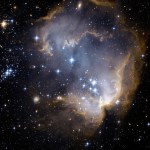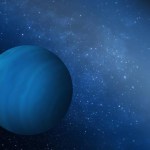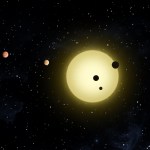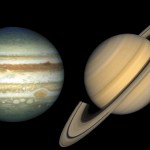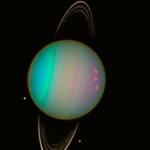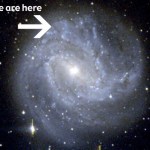planet
“I have announced this star as a comet, but since it is not accompanied by any nebulosity and, further, since its movement is so slow and rather uniform, it has occurred to me several times that it might be something better than a comet. But I have been careful not to advance this supposition to the public.” -Giuseppe Piazzi
So it begins again: the neverending debate about who gets to be a planet and who doesn't. Everyone can bring their own interpretation of the science to the table -- and everyone has their own preferred naming scheme -- but when I think about the Solar System, I try…
"Like all animals, human beings have always taken what they want from nature. But we are the rogue species. We are unique in our ability to use resources on a scale and at a speed that our fellow species can't." -Edward Burtynsky
It's really a romantic notion when you think about it: the heavens, the Milky Way, is lined with hundreds of billions of stars, each with their own unique and varied solar systems.
Image credit: 湖北直行便 of AstroArts, via http://www.astroarts.jp/photo-gallery/photo/13870.html.
But beyond that -- in addition to the stars -- there are hundreds of billions of planets…
"Death comes to all, but great achievements build a monument which shall endure until the sun grows cold." -Ralph Waldo Emerson
In the great cosmic ocean, there's only one planet that we know -- for certain -- has the right conditions and history to result in intelligent life: our own.
Image credit: NASA, from the Space Shuttle, for Sun-Earth Day 2008.
Life -- or even intelligent life -- may be possible in environments vastly different than our own: around different classes of stars, at different temperatures, and even with different molecules and/or chemical elements.
But we know…
"Don't go around saying the world owes you a living. The world owes you nothing. It was here first." -Mark Twain
So, you've been around a while, seen all sorts of things, and learned an awful lot about the world, solar system and Universe that we live in. But how well do you know it, really?
Image credit: NASA / Lunar and Planetary Laboratory.
To scale and in order, these are the eight planets you know so well. There are the four rocky worlds of our inner solar system: Mercury, Venus, Earth, and Mars, and the four gas giants that dominate the outer solar system: Jupiter, Saturn, Uranus, and…
By Dr. Mark R. Showalter
Planetary astronomer at the Carl Sagan Center for the Study of Life in the Universe, SETI Institute
It was just a few months ago that Stephen Hawking was making headlines with his bold assertion that extraterrestrial beings, if they exist, are best avoided. His argument was based in part upon the fact that the arrival of Christopher Columbus to the "New World" didn't work out so well for the Native Americans who were already here. However, upon closer inspection, Hawking's ideas fell apart. Even if nomadic tribes of ETs are really out there looking for a handy source…
By Dr. Mark R. Showalter
Planetary Astronomer at the Carl Sagan Center for the Study of Life in the Universe, SETI Institute
In 1609, Galileo introduced to the world his new invention, the astronomical telescope. It opened up new opportunities to explore a territory that all prior generations had regarded as familiar--the night sky. In short order, he was making major discoveries. But the sky is very big and Galileo's telescope was very small. He had to choose his targets carefully.
In that context, Saturn was nothing special, the least of the known planets, just a bright point in a black…
by Nathalie A. Cabrol
I realize how immodest the title of this first blog may sound and it is certainly not my intention to convince anybody that I will answer this question in the limited space allowed here or even in a lifetime. My hope is, instead, to stir thoughts and invite an exchange of diverse perspectives to make this a thread that we can all pull from time to time. It is an immense subject debated in an abundant literature, but discussing it is certainly not the exclusive privilege of those called explorers. All beings, from the greatest minds to the simplest forms of life on this…
Using the Hubble Telescope, scientists have successfully viewed a planet revolving around a different star than our beloved Sun for the first time. The planet has been dubbed Fomalhaut b and revolves around the star Fomalhaut, the brightest star in the constellation Piscis calculated to reside about 25 light years away. ScienceBlogger Steinn Sigurðsson broke the news on Dynamics of Cats, and has posted multiple images of the planet.
(This is adapted from my public lecture, Afraid of the Dark: How We Know What We Can't See.)
Let's go back over 200 years ago, to 1781. William Herschel (left) discovered the planet Uranus, noticing that an object, as bright as a star, was actually moving relative to the other stars. The other five inner planets (besides Earth) were known for over 2000 years before that. But it was thought for a long time that Saturn was the farthest one.
But it clearly isn't; as you can see with modern telescopes, Uranus is a super-interesting planet, rotating on its side, surrounded by rings and moons.…
Can you believe that I had a fight today with someone who's been dead for over 350 years, and I'm losing? -- Ethan, yesterday
Of course you can believe it, when the man I'm fighting with is Johannes Kepler. I don't get a chance to tell you about my research very often, mostly because it's still a work in progress. But my latest paper was just submitted and is now out of the way, and so I'd like to tell you what I'm working on at the moment.
Well, there we are in the galaxy. We look up at the night sky, and we see our planets as well as all the stars that surround us. But you know what we don…
